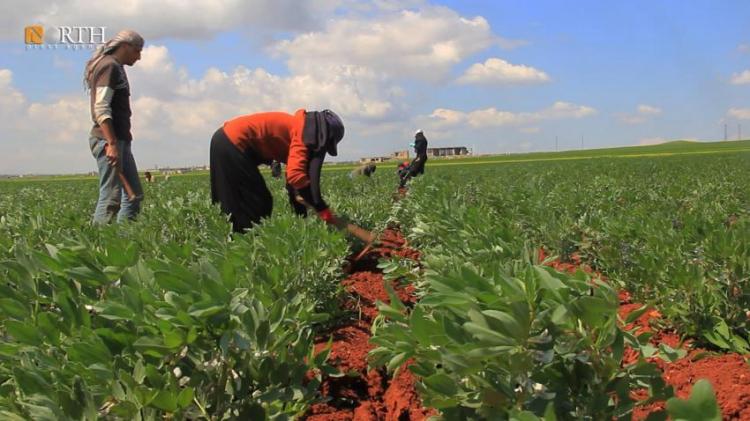Idlib – North-Press Agency
Workers in Idlib's eastern countryside, northern Syria, are confused about how to both protect themselves against coronavirus and secure their basic needs, especially in the absence of a clear plan to manage the crisis caused by the virus and the repercussions of preventative measures after the number of deaths and infections broadcasted by the media daily.
Abdul Majeed Abu Riyad, 50, who runs an agricultural workshop, said that they can only follow some of the preemptive steps against coronavirus, such as wearing masks and gloves. "Although the virus has come close to us, beside the Ministry of Health's warnings, but if people don't work, they cannot live, especially in light of the poor living conditions in the region.”
The high prices of food and supplies, in conjunction with the closure of the crossings with the areas controlled by the armed opposition groups, caused another aspect of suffering, while the Idlib governorate suffers from the crowding of displaced people and the camps, and the majority of its residents are busy securing their livelihoods.
Muhammad al-Badawi, an agricultural worker at the Abdul Majeed Abu Riyadh workshop, told North-Press: “There are many warnings launched in northern Syria for people to stay at home due to the fear of the spread of coronavirus, but we cannot stop working. Although I did not stop working in these circumstances, what I receive from my daily wage is not enough for my family to live in light of the high prices in the markets. I cannot stay at home because we will starve to death.”
The waves of IDPs that flocked to Idlib governorate as a result of the hostilities in the governorate’s south and the adjacent governorates prompted many children to begin working in certain professions and businesses to earn a living for themselves and their families.
Ali Issa, 12, said that he had to work and leave his education in school to help his family secure their living needs.
"We do not have enough money to buy bread. I work with all of the members of my family so that we can live and get our food and clothes, because we have no breadwinner except our hard work!”
Muhammad al-Khatib, a dentist and displaced person from Tseel town in Daraa's countryside, says crowding should be minimized as much as possible and in all circumstances.
"Yes, there is a problem in the workshops that work in agricultural lands to harvest crops, etc. At least 15 workers leave the workplace in one car, and it is better for them to follow the preventative measures before leaving their house."
The Minister of Health of the Syrian Interim Government (an alternative opposition-formed government), Maram al-Sheikh, published on his Twitter account that all samples that were examined for COVID-19 in the Early Warning Center in northern Syria are negative.

